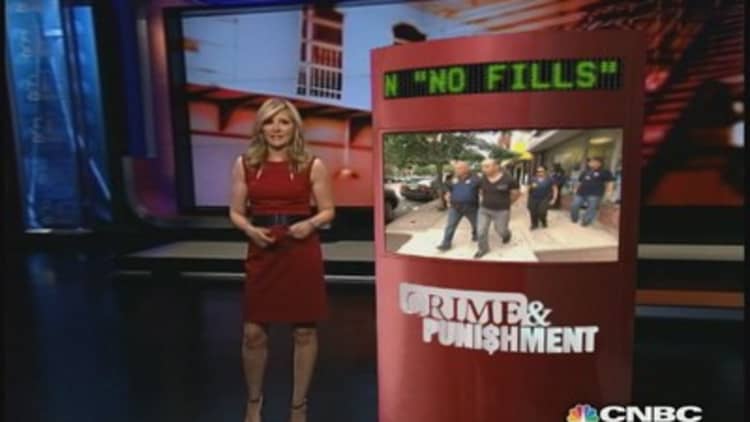Deep staff cuts are hitting a federal agency responsible for investigating health-care fraud just as Obamacare is due to kick in, leaving less people to investigate an ever-growing crime that costs taxpayers billions of dollars.
And in a perverse twist, the funding cuts at the Health and Human Services Department's Inspector General's Office might save money in the short term for the U.S. taxpayer. But over the long run, more money that could have been recouped from the fraud cases now going unpursued, is being left on the table, the agency said.
For every $1 spent on health-care fraud probes, nearly $8 is recouped in fines, restitution or settlements, according to HHS.
"With fewer agents we investigate fewer cases, and with fewer cases we're likely to have fewer convictions, few civil settlements, which will likely translate into less recoveries," said Gary Cantrell, deputy inspector general for investigations at HHS, which investigates Medicare and Medicaid fraud.
"The problem is certainly growing . . . yet our resources are declining."
The Office of Inspector General is halfway to its goal of reducing staff by a total of 400 people from a previous level of about 1,800 employees. The cuts, which may continue into 2015, are being made because OIG is faced with $30 million in expiring funding streams, another $25 million in funds that have been authorized but not appropriated since 2009, and about $15 million in cuts as a result of the federal government's sequestration spending reductions.
(Read more: Medical ID theft could kill you)
Staff for Sen. Tom Harkin, D-Iowa, noted that the Appropriation Committee subcommittee on health that he chairs "is trying to make up for the expiring funding streams" by including tens of millions of dollars in spending increases for OIG.
But there is no guarantee those increases will make it through the Senate, much less be approved by a Republican-controlled House of Representatives.

The dollar amounts being cut from OIG's budget are a pittance compared to the amount of money that can and has been recovered by the government in health-care fraud cases, and compared to the tens of billions of dollars lost in Medicaid and Medicare fraud each year.
Millions on the line
The money at stake varies. In 2012, drug giant GlaxoSmithKline agreed to pay the U.S. government a whopping $3 billion for, among other things, promoting antidepressant prescriptions to children despite those drugs not being approved for kids.
While the GSK case is a high-water mark, it is not unusual for health-care fraud cases to recoup millions of dollars.
Earlier this year, for example, a judge slapped a $17.3 million fine on corrupt Detroit-area pharmacist Babubhai Patel as he sentenced Patel to 17 years in prison for fraud involving Medicare, Medicaid and private insurance.
With the roll-out of Obamacare, which will expand Medicaid enrollment rolls, as well increase the number of people with private medical insurance, Cantrell and others expect there to be even more opportunities for fraud.
(Read more: The new health-care scam that's ripping off taxpayers)
"We already turn down work that we can't proceed on. It's only going to increase with the continued expansion of the Medicaid program because of the Affordable Care Act," Cantrell said.
"Last year, we closed over 1,200 complaints because of lack of resources," Cantrell said. "That number's going to be pretty high this year as well, likely to exceed 1,000."
Louis Saccoccio, president of the National Health Care Anti-Fraud Association, a private-public partnership, said the cut to OIG's budget "doesn't make any sense."
"You're spending close to half a trillion dollars on Medicare, and another $400 billion or so in Medicaid. You have to invest in ensuring the integrity of these programs," Saccoccio said. "When you have this amount of investment, it just doesn't make much sense to cut."
Former U.S. Senate Majority Leader Bill Frist, a Tennessee Republican who is also a cardiothoracic surgeon, predicted, "Substantial cuts will translate into greater abuse, waste and fraud."
Health at risk
At stake in those cuts is not just the dollars lost.
"The bottom line to all this is, besides the money, the public health," said Lauren Mack, who heads health-care fraud prosecutions for the Brooklyn District Attorney's office in New York City, which often partners with federal authorities.
"We find doctors who are diluting flu shots, pharmacists putting out tainted pills," Mack said. "We have had people giving pacemakers to people who don't even have heart problems."
"There are 774 pharmacies in Brooklyn," Mack said. "There are a lot of bad little shops. Those little frauds, those little crimes add up. That's a constant bleed. If you don't have these people closed down by agents, that amounts to a big bleed—that's a gusher."
OIG's Cantrell said that while his office's value often is measured in fines and settlement amounts in the millions of dollars or more, another measure is reductions in unnecessary Medicaid and Medicare reimbursements.
Cantrell noted that in 2011 Miami resident Lawrence Duran was sentenced to 50 years in prison for a $205 million Medicaid scam involving his community mental health company American Therapeutic. Duran also was ordered to pay $87 million in restitution.
(Read more: Obamacare is coming and so are the con artists)
Duran's scheme, which involved bogus Medicaid claims, was brought down by the Medicare Fraud Strike Force, a joint HHS and Justice Department effort that operates in nine metropolitan areas and has lead to charges against more than 1,500 people for more than $5 billion in false billings since the unit began in 2007.
"We saw this scheme, and others like it in south Florida and Louisiana," Cantrell said. "Largely as a result of law-enforcement efforts, we saw significant reductions of Medicare outlays."
In other words, after Duran was busted, other community mental health centers reduced their billings to Medicare, a possible sign that at least some of them may have been engaging in fraud.
—By CNBC's Dan Mangan. Follow him on Twitter @_DanMangan.


